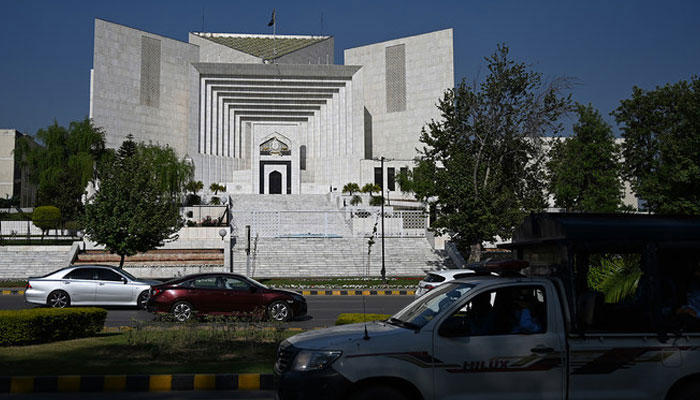Time for stability
During full-court meeting chaired by CJP Yahya Afridi, discussions centred on backlog reduction
The government’s recent decision to increase the number of Supreme Court judges from 17 to 23 marks an important step toward addressing the extensive backlog of pending cases. This measure, expected to be introduced in the National Assembly on Friday, has long been advocated by the legal community, which has emphasised the urgent need to increase the judiciary’s capacity not only at the SC level but across high and lower courts as well. Currently, 59,191 cases remain pending in the Supreme Court alone – a daunting figure that underscores the need for reform. During the first full-court meeting chaired by Chief Justice of Pakistan (CJP) Yahya Afridi, discussions centred on backlog reduction and enhancing judicial efficiency. Chief Justice Afridi’s swift focus on these critical issues has been well received, as his reputation for non-partisanship and judicial integrity brings renewed hope for progress. The judiciary’s proactive stance on case management aligns with earlier government discussions about a federal constitutional court, which also emphasised the importance of effective case resolution.
However, speculation about a potential 27th Amendment – allegedly related to judicial matters – has surfaced following the recent passage of the 26th Amendment. The government has dispelled these rumours, and sources have indicated that the amendment in question might address long-standing demands for provincial rights and local governance. Given the current climate, political observers caution that any new constitutional amendment should avoid judiciary-related topics, given the recent friction between the executive and judiciary. The appointment of Chief Justice Afridi and the enactment of the 26th Amendment signal a new chapter in judicial-executive relations; now is the time for the government to pause before reintroducing contentious issues. A renewed focus on governance and economic stability should be the government’s next move, especially given recent signs of economic recovery. This approach aligns with the recent release of PTI chairman Imran Khan’s wife, Bushra Bibi, which some see as a step toward fostering political stability. The government’s intentions seem to be directed toward allowing the PTI to maintain governance in Khyber Pakhtunkhwa while functioning as the opposition at the federal level and in Punjab. However, this strategy’s success will depend largely on Imran Khan’s leadership and the PTI’s political posture in the coming weeks.
The lessons of history are clear – long-standing power struggles often derail national progress. The government would be wise to channel its energies into strengthening institutions and allowing them to operate independently, free from unnecessary interference or controversy. Now, with economic gains beginning to manifest, the focus should be on translating these improvements into tangible benefits for the public. Only through stability, both political and economic, can the country begin to address the broader challenges it faces, from poverty alleviation to infrastructure development. This is why the government must resist the urge to enter new political battles that could undermine the strides it has made. Stability, not strife, must be the guiding principle for a path forward that genuinely serves the nation’s best interests. The country needs institutions that function effectively, reforms that bring lasting change, and a government that places the public interest above partisan priorities.
-
 Gabourey Sidibe Gets Candid About Balancing Motherhood And Career
Gabourey Sidibe Gets Candid About Balancing Motherhood And Career -
 Katherine Schwarzenegger Shares Sweet Detail From Early Romance Days With Chris Pratt
Katherine Schwarzenegger Shares Sweet Detail From Early Romance Days With Chris Pratt -
 Jennifer Hudson Gets Candid About Kelly Clarkson Calling It Day From Her Show
Jennifer Hudson Gets Candid About Kelly Clarkson Calling It Day From Her Show -
 Princess Diana, Sarah Ferguson Intense Rivalry Laid Bare
Princess Diana, Sarah Ferguson Intense Rivalry Laid Bare -
 Shamed Andrew Was With Jeffrey Epstein Night Of Virginia Giuffre Assault
Shamed Andrew Was With Jeffrey Epstein Night Of Virginia Giuffre Assault -
 Shamed Andrew’s Finances Predicted As King ‘will Not Leave Him Alone’
Shamed Andrew’s Finances Predicted As King ‘will Not Leave Him Alone’ -
 Expert Reveals Sarah Ferguson’s Tendencies After Reckless Behavior Over Eugenie ‘comes Home To Roost’
Expert Reveals Sarah Ferguson’s Tendencies After Reckless Behavior Over Eugenie ‘comes Home To Roost’ -
 Bad Bunny Faces Major Rumour About Personal Life Ahead Of Super Bowl Performance
Bad Bunny Faces Major Rumour About Personal Life Ahead Of Super Bowl Performance -
 Sarah Ferguson’s Links To Jeffrey Epstein Get More Entangled As Expert Talks Of A Testimony Call
Sarah Ferguson’s Links To Jeffrey Epstein Get More Entangled As Expert Talks Of A Testimony Call -
 France Opens Probe Against Former Minister Lang After Epstein File Dump
France Opens Probe Against Former Minister Lang After Epstein File Dump -
 Last Part Of Lil Jon Statement On Son's Death Melts Hearts, Police Suggest Mental Health Issues
Last Part Of Lil Jon Statement On Son's Death Melts Hearts, Police Suggest Mental Health Issues -
 Leonardo DiCaprio's Girlfriend Vittoria Ceretti Given 'greatest Honor Of Her Life'
Leonardo DiCaprio's Girlfriend Vittoria Ceretti Given 'greatest Honor Of Her Life' -
 Beatrice, Eugenie’s Reaction Comes Out After Epstein Files Expose Their Personal Lives Even More
Beatrice, Eugenie’s Reaction Comes Out After Epstein Files Expose Their Personal Lives Even More -
 Will Smith Couldn't Make This Dog Part Of His Family: Here's Why
Will Smith Couldn't Make This Dog Part Of His Family: Here's Why -
 Kylie Jenner In Full Nesting Mode With Timothee Chalamet: ‘Pregnancy No Surprise Now’
Kylie Jenner In Full Nesting Mode With Timothee Chalamet: ‘Pregnancy No Surprise Now’ -
 Laura Dern Reflects On Being Rejected Due To Something She Can't Help
Laura Dern Reflects On Being Rejected Due To Something She Can't Help




